🤓 The 2026 Local Search Ranking Factors are here!! Check out the report!
🤓 The 2026 Local Search Ranking Factors are here!! Check out the report!



(Edited for blog)
E-A-T stands for Expertise, Authoritativeness and Trustworthiness. It comes directly from the Google Search Quality Rater Guidelines, which is a 160+ page document used to train real human search quality evaluators, who basically provide information to Google about how much they can trust a given webpage, how high quality it is, how much it meets their expectations, etc. E-A-T is the criteria that they use in these evaluations.
If you’ve heard me talk about E-A-T, you’ve also probably heard me talk about what I refer to as the E-A-T Ecosystem. What do I mean by that? Basically, it’s not just organic search where E-A-T plays a role. It’s something that Google has been focusing on throughout what I call the E-A-T ecosystem of different Google products. Of course, things like Google News and Google Discover where news and political information and science and all that stuff is being circulated, E-A-T is going to be very important there. But it’s also important for products like YouTube, what’s displayed in Featured Snippets, and what’s displayed on Google images.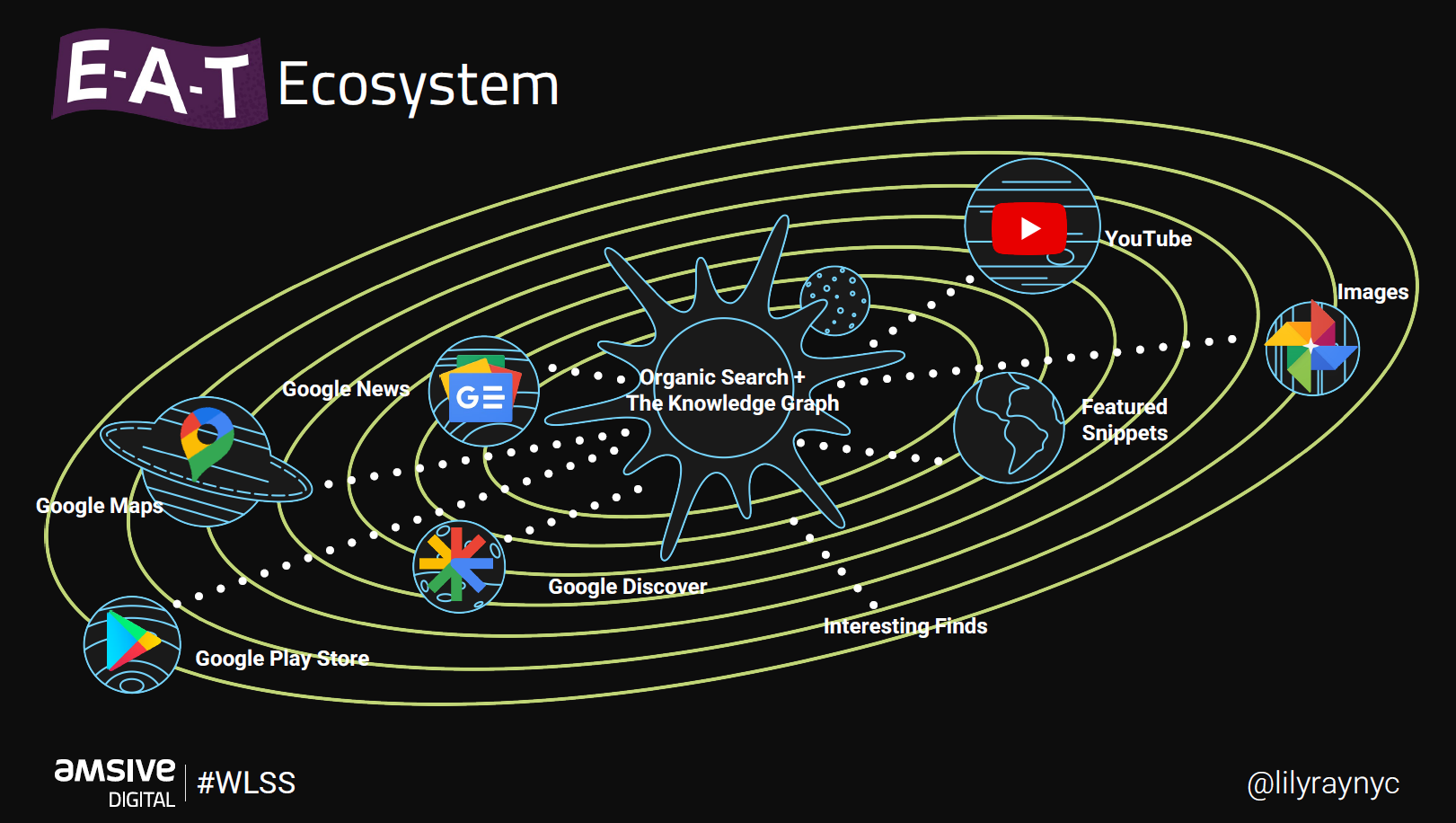 Today, we’re really going to be focused on the role that E-A-T plays specifically in Google Maps and in local search.
Today, we’re really going to be focused on the role that E-A-T plays specifically in Google Maps and in local search.
A Google Business Profile is your entry point into the Knowledge Graph
Well, first and foremost, a Google My Business Profile (Google Business Profile) can actually serve as an entry point to getting your business entity listed in Google’s Knowledge Graph.
I personally think that the Knowledge Graph plays a really big role in a lot of the E-A-T evaluations that Google is making about different entities and individuals and brands.
What is the Knowledge Graph? It’s basically Google’s brain. It’s a massive database of over 500 billion facts about 5 billion entities. You can often see that there’s this interplay between Google My Business Information, as well as the knowledge panel or Knowledge Graph information. So here we have the New York Stock Exchange.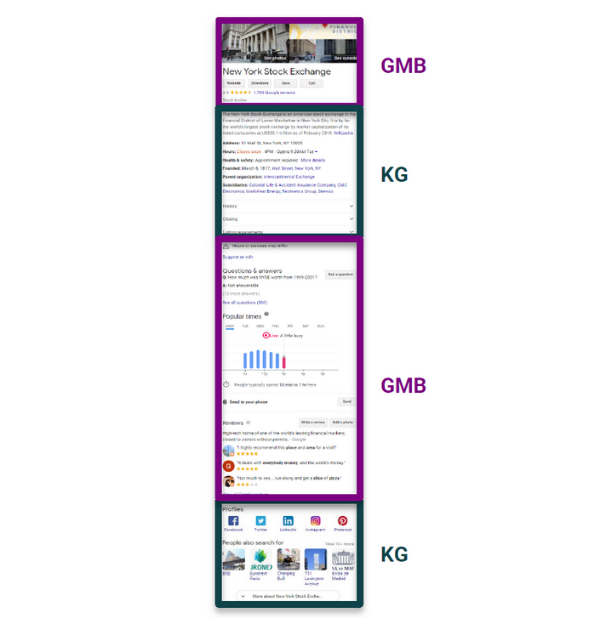 And you can see that there’s this interplay between the data that they’re pulling directly from Google My Business as it relates to actually visiting the New York Stock Exchange, and also Knowledge Graph information. They’ve actually blended together those two data sources to show information about this entity.
And you can see that there’s this interplay between the data that they’re pulling directly from Google My Business as it relates to actually visiting the New York Stock Exchange, and also Knowledge Graph information. They’ve actually blended together those two data sources to show information about this entity.
Getting your business on Google My Business is a great entry point to getting in the Knowledge Graph.
Structured data informs E-A-T
You can also use structured data throughout your website to help inform or confirm different data points about your business. For example, you can use person structure data about your business owner or the people that work for your company. You can have organizational structure data that talks about who your brand is, when it was founded, what your brand knows about and things like that.
Then of course, local business structure data is really great to convey information about the business itself. There’s more specific data types or structured data types that you can use for local businesses. I would encourage you to use those as well when applicable.
For more information about getting your brand or your information listed in the Knowledge Graph, I would encourage you to check out this great resource by Jason Barnard, in which he talks about a master list of sites that Google pulls from in order to populate Knowledge Graph information. There’s a lot of creative ways that you can get your business or the people that work at your business listed in the Knowledge Graph, which I think is a really great starting point for conveying good E-A-T.
Now as it relates to Google’s Search Quality Rater Guidelines, they don’t talk too much about local business, but one example that they do provide is this restaurant website.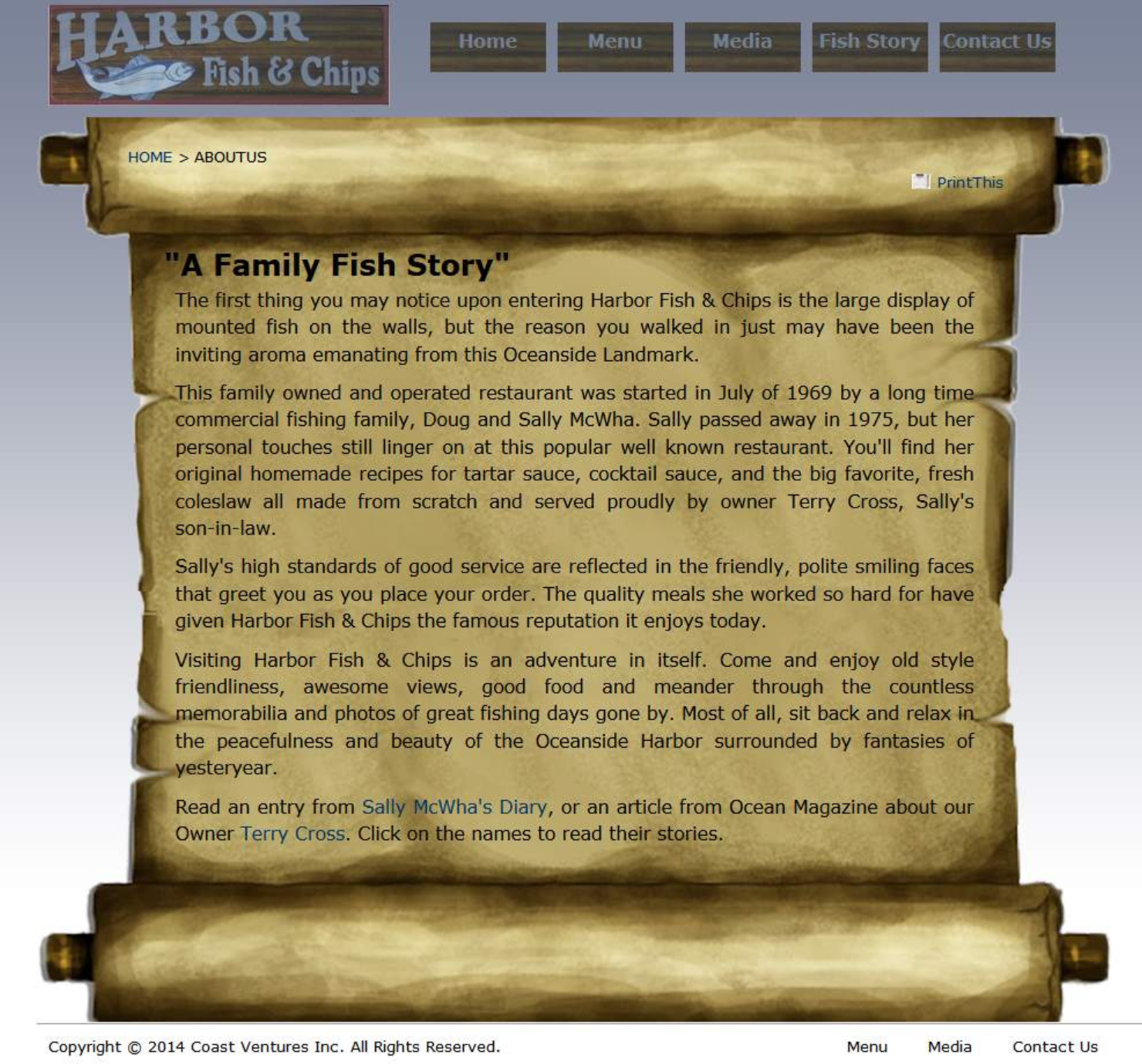 They talk about a restaurant called Harbor Fish and Chips and tell their search quality evaluators that this is a very authoritative page or has a lot of E-A-T because this is a business that’s basically talking about itself. It has an address, menu and contact information. This website is authoritative because it’s a website about Harbor Fish and Chips.
They talk about a restaurant called Harbor Fish and Chips and tell their search quality evaluators that this is a very authoritative page or has a lot of E-A-T because this is a business that’s basically talking about itself. It has an address, menu and contact information. This website is authoritative because it’s a website about Harbor Fish and Chips.
That’s interesting to think about. Just making sure that you have crucial business elements on your website is sufficient to show good E-A-T for local businesses. This can include:
In the Google Search Quality Rater Guidelines, they also talk about looking for articles, reviews, forum posts, or discussions (anywhere people are talking about your business), for example, Yelp, the Better Business Bureau, Amazon, or Google Shopping. These are all the different third-party review sites that can provide qualitative information that helps search quality evaluators understand how consumers and customers feel about businesses.
If you have a really poor reputation on the Better Business Bureau, that can actually factor into how those evaluators rate your E-A-T, which could ultimately affect your performance.
Now, what features does Google offer a business in order to improve or convey good E-A-T? Well, you’ll notice that it’s a lot of the same factors that we talked about in local search as a whole. Making sure you’re leveraging all known best practices and strategies that impact local ranking factors.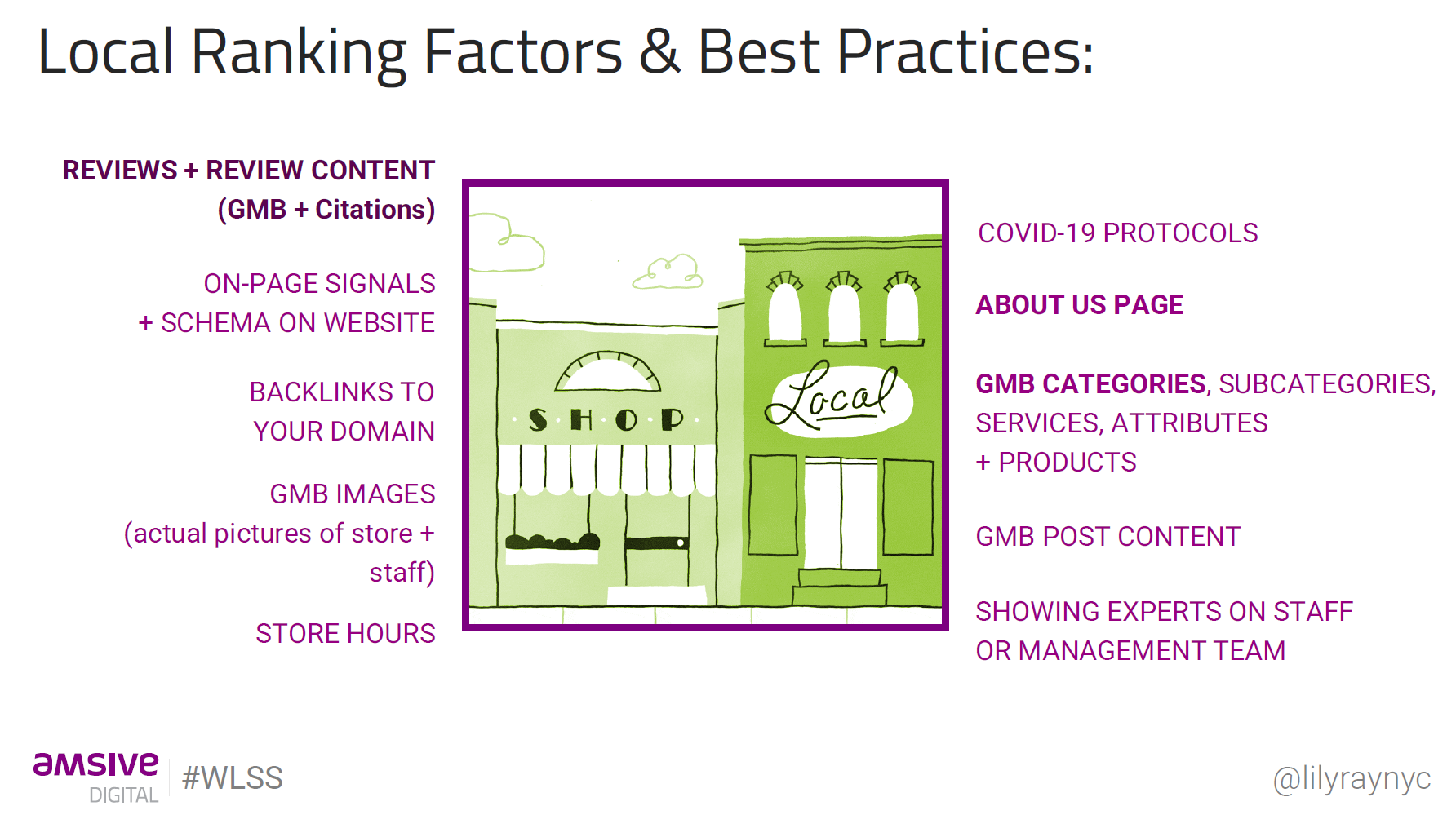 Things you can do to improve your business’s E-A-T
Things you can do to improve your business’s E-A-T
Google My Business guidelines also talk about the role that reviews plays. This is pretty self-explanatory, but having good high quality positive reviews from your customers is basically in and of itself a ranking factor for Google My Business that I think is one of the primary drivers of how Google evaluates E-A-T on the local level.
You can also consider adding robust author or business owner pages to your site. This is pretty standard recommendation when it comes to E-A-T.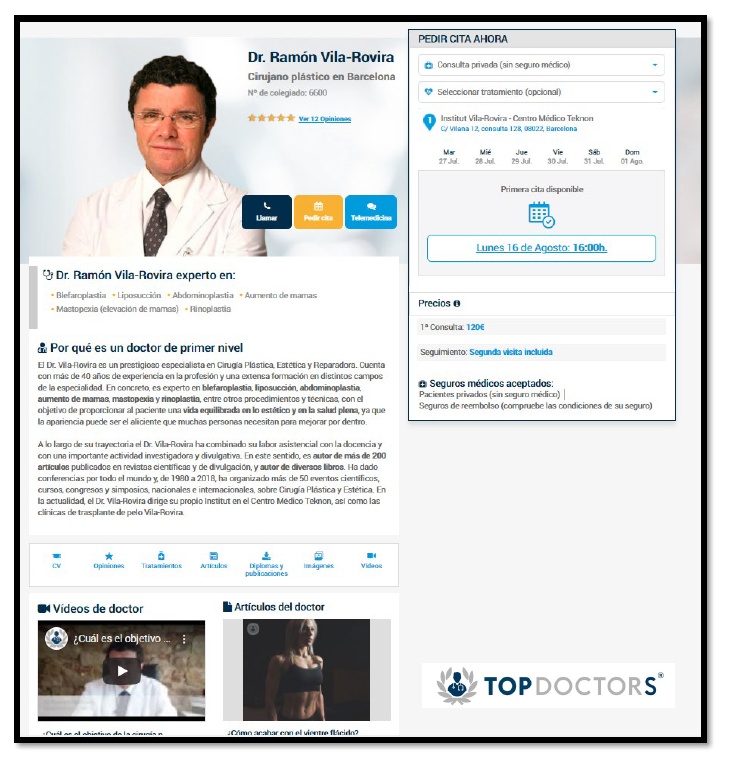 Embrace an expert-led content strategy
Embrace an expert-led content strategy
Now all of that said, all that’s great. We’ve talked about a lot of those things for a few years now. But what I want to focus on today and what I think one of the best ways that small businesses can improve their E-A-T or how they convey E-A-T is by employing an expert-led content strategy throughout the site. Now, what does that mean?
Here’s a quick pop quiz. Guess which one of the following tools can provide entirely unique content ideas?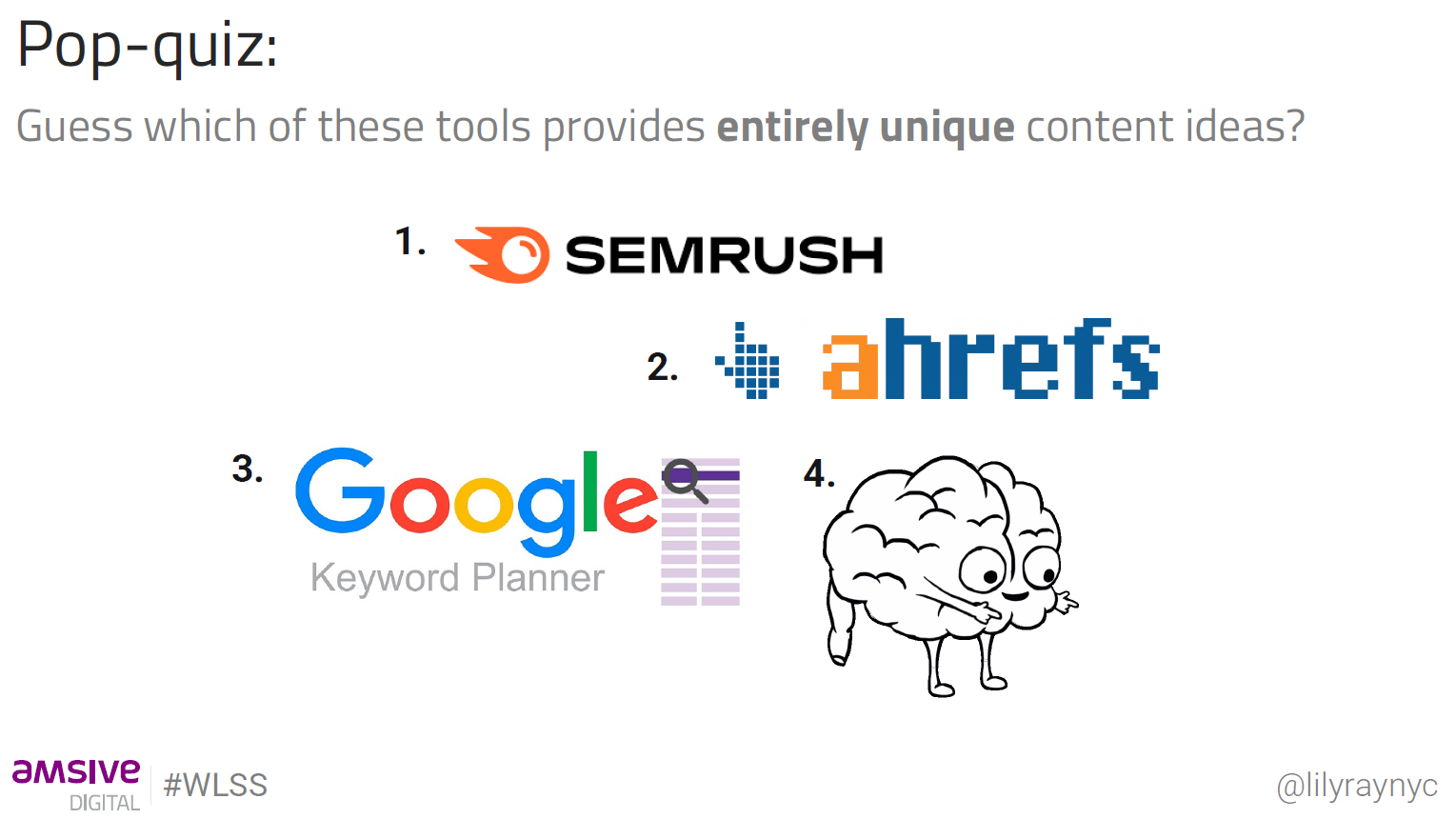
Well, if you guessed the human brain, you’re correct. And the reason for that is because the other tools that are out there – nothing wrong with them, they’re all great tools – but they’re all working with a data set of things that people have already searched for.
The human brain, especially the expert human brain has insights and knowledge that are not necessarily available in these tools. And in many cases, they can provide the actual information that users are looking for in a way that you can’t surface just by using the same SEO tools that everybody else is using.
I like to include this example of a stock photo that we’re all probably familiar with, if not this photo, we’ve all probably used very similar stock photos in our in our digital marketing journeys. But think about this actual person in this photo. This person, this business owner, this business employee is an actual expert. They work there every day, they know the thing that they’re selling, the products and services that they’re working on better than anybody.
But think about this actual person in this photo. This person, this business owner, this business employee is an actual expert. They work there every day, they know the thing that they’re selling, the products and services that they’re working on better than anybody.
Can you work with that person as part of your digital marketing and your content creation strategy?This information was originally presented at the 2021 Whitespark Local Search Summit. Level up your local marketing skills with our Video Bundle ($199 USD). Learn local search best practices to help drive growth, build stronger customer relationships, and expand your knowledge. As a bonus you will get access to all of the videos from our 2020 event!
Now let’s take a step back and talk about how E-A-T doesn’t work. So, this is an oversimplified approach that many people get confused by, when they’re trying to improve how they convey E-A-T throughout their site.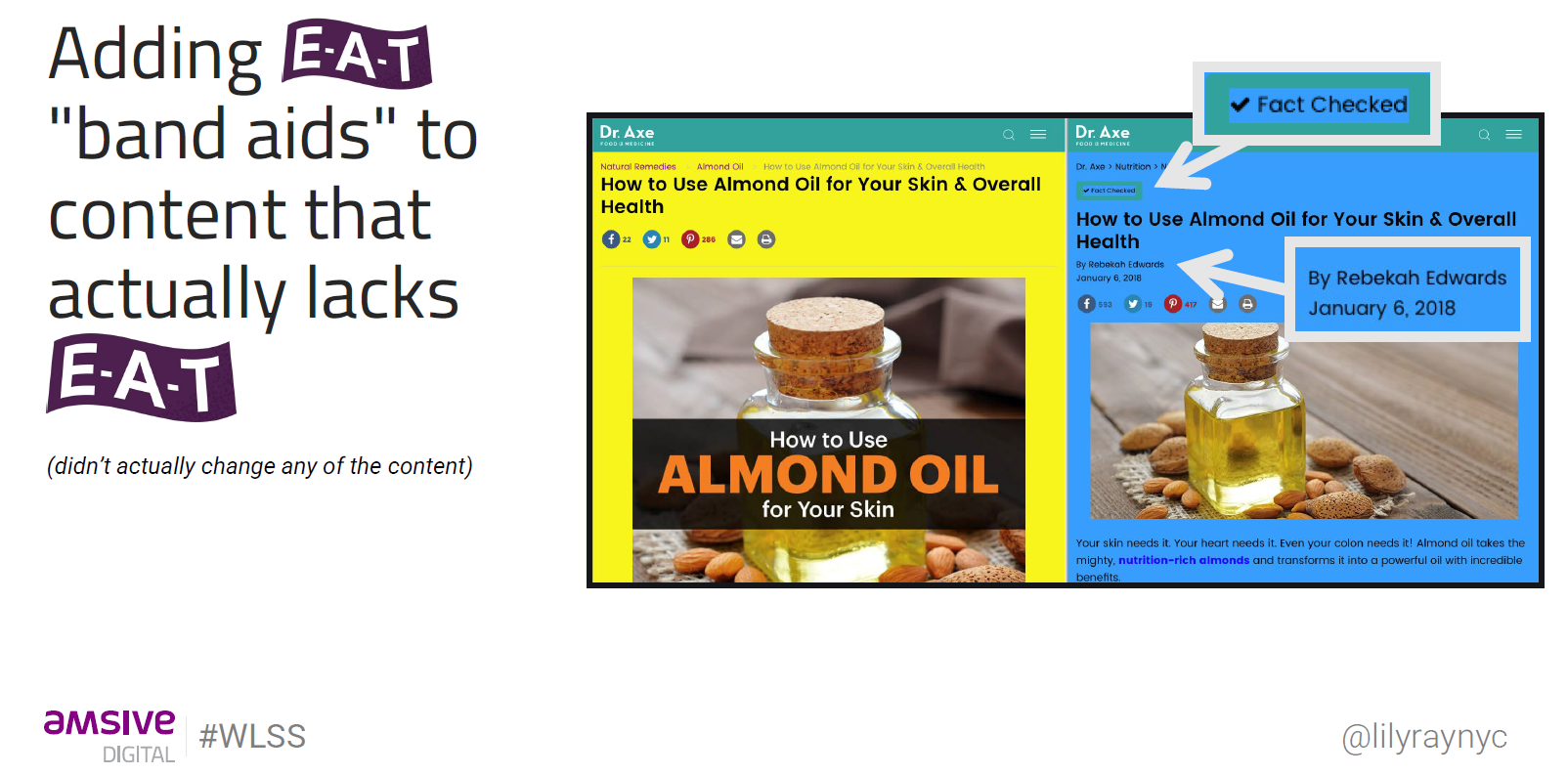 This is an example of a site that got hit by a variety of different algorithm updates. And you can see they went back in there and tried to add, “this information was fact checked” or “here’s the author that wrote this information”.
This is an example of a site that got hit by a variety of different algorithm updates. And you can see they went back in there and tried to add, “this information was fact checked” or “here’s the author that wrote this information”.
I call these E-A-T band aids because if you look at the content itself, nothing actually changed. It’s not enough to just say this was written by an expert. It’s not enough to just say this was fact checked, you have to actually do the work of improving and updating the content.
Another place that people tend to get E-A-T wrong, is doing a process that looks like this:
Now why is that? That’s because improving your content or updating your content requires actual effort and actual expertise., this was a tweet that I shared of another example of a science journal, the content didn’t change at all, but they did add, you know, this was scientifically reviewed or updated on this new date. But didn’t actually change any of the content. If you’re going to be doing things like adding enhancements that are meant to convey better E-A-T to users and search engines, please make sure that you’re actually reviewing the content and that the content is being evaluated and fact checked by actual experts.
Adding author biographies is a great starting point. But it doesn’t replace real subject-matter expertise. And this is where working with the business, working with the small business owner, or working with the people that work at the business can really come in handy.
I worked with a Google patent expert, Bill Slawski, last year to write an article about the various ways that Google understands content. And in fact, Google has a patent that actually allows them to differentiate between expert and lay person content. We don’t exactly know how this works, but they can do it. So, it’s really important to remember, if you’re going to have content on your website about a certain area of expertise, make sure that you’re working with the real experts in that area to at least validate that content, if not write that content.
Here’s some examples of what that looks like in the wild.
Joe Gardener – Expert
Here’s a website called Joe Gardener. He talks about gardening content, he has a gardening store on his website, and is known as a gardening expert. He ranks in top positions for a variety of different gardening related keywords like “raised bed garden”, “gardener lawn”, “seed starting”, “garden fertilizer.” And what’s he doing here?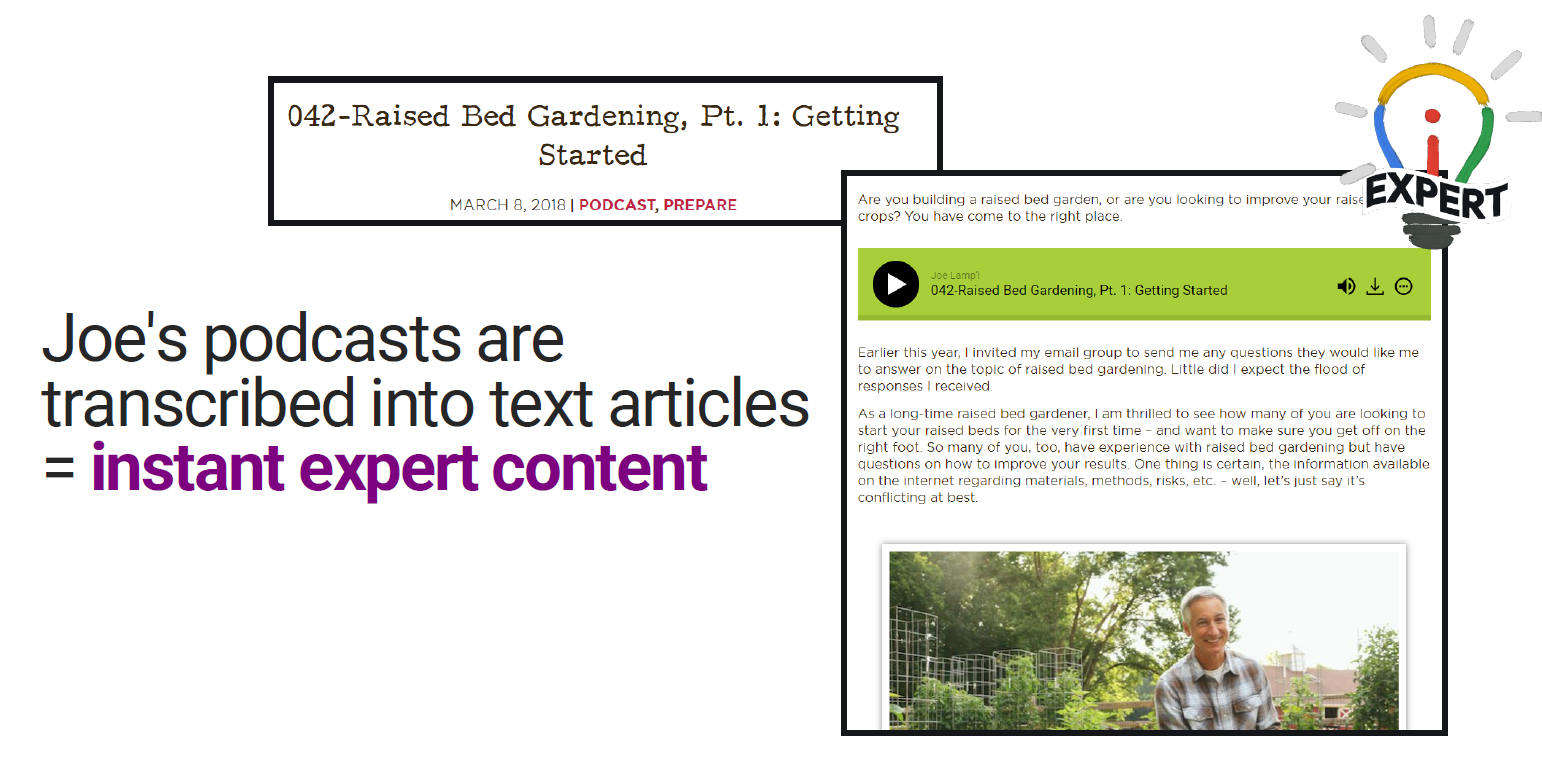 Joe is the guy that’s gardening, so he’s busy doing that, but he does these podcasts. He’s just talking about the things that he’s learned on the job. Those podcasts are then transcribed. Boom! Massive expert-written content that’s crawlable for SEO. Literally written by an expert, and it conveys actual subject-matter expertise. Because he’s quite literally in the weeds every single day working on gardening, you cannot replicate that if you don’t have somebody who’s actually doing the work helping you to produce that content.
Joe is the guy that’s gardening, so he’s busy doing that, but he does these podcasts. He’s just talking about the things that he’s learned on the job. Those podcasts are then transcribed. Boom! Massive expert-written content that’s crawlable for SEO. Literally written by an expert, and it conveys actual subject-matter expertise. Because he’s quite literally in the weeds every single day working on gardening, you cannot replicate that if you don’t have somebody who’s actually doing the work helping you to produce that content.
Mike Holmes
Another example would be Mike Holmes. This is a Canadian home contractor who works on a variety of home improvement projects. He’s seen a big increase in visibility over the past couple of years. He ranks for a variety of very high-volume keywords related to home improvement projects. So like “basement bathroom”, “crawlspace”, “kids bedroom ideas”.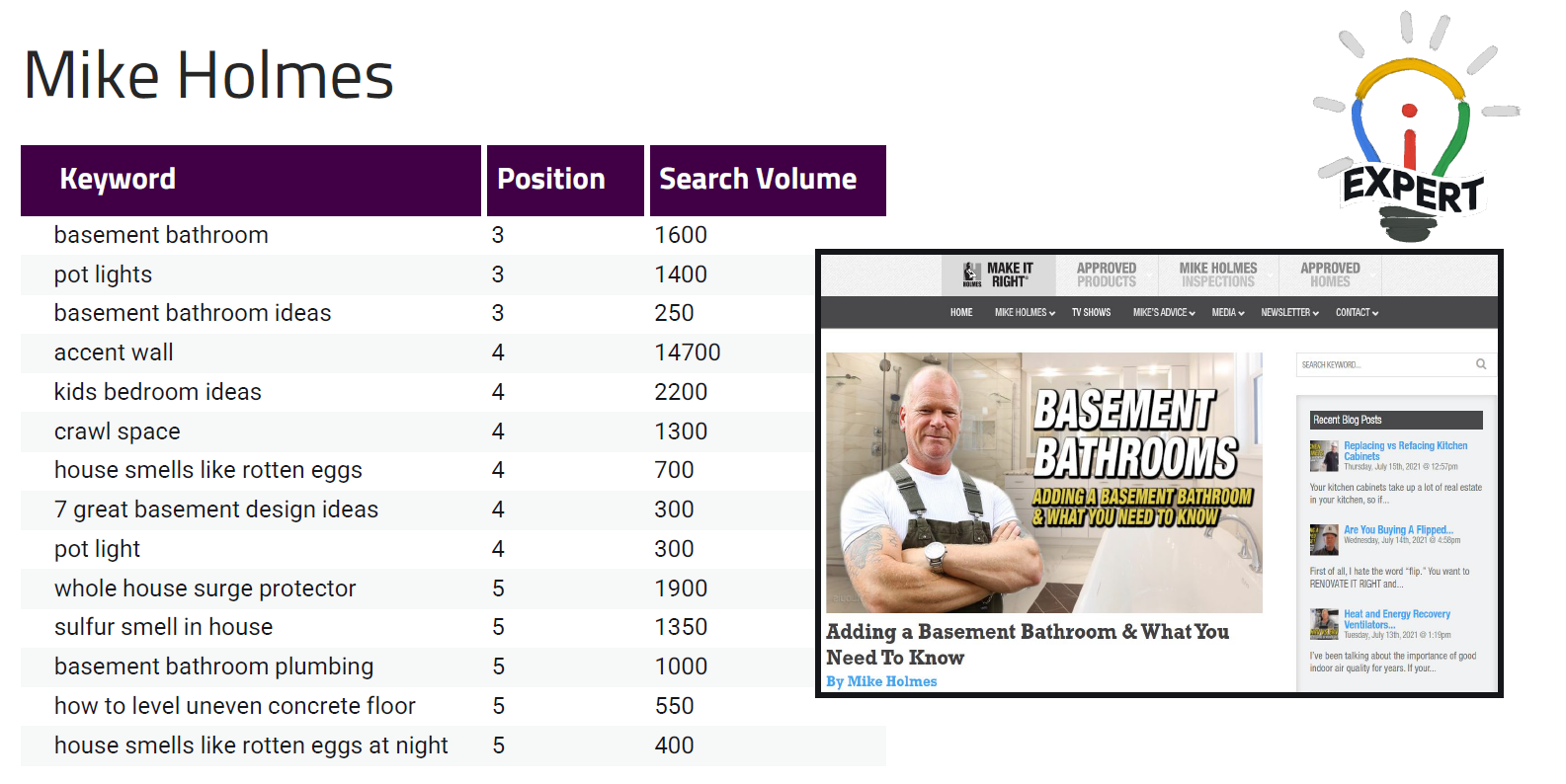 If you read the content it almost feels like stream of consciousness. He’s like, I do these projects all the time. I do this all day. Here’s what I’ve noticed. Here’s the roadblocks that I’ve encountered when I built a child’s bedroom (or whatever the case may be). But he’s a real expert and you can’t compete with that, because he’s the one that knows how to do the work.
If you read the content it almost feels like stream of consciousness. He’s like, I do these projects all the time. I do this all day. Here’s what I’ve noticed. Here’s the roadblocks that I’ve encountered when I built a child’s bedroom (or whatever the case may be). But he’s a real expert and you can’t compete with that, because he’s the one that knows how to do the work.
Majestic Tattoo NYC
Another example is a tattoo shop that I’ve worked with here in New York. My content creation process with this tattoo artist was to say, hey, while you’re tattooing, talk to me about why I should put lotion on my tattoo or talk to me about how to come up with a unique tattoo idea. The artist spoke and told me everything he knows, I wrote it down, optimized it a little bit for SEO. This was four to five years ago, I haven’t touched the content since. These screenshots were taken in 2021.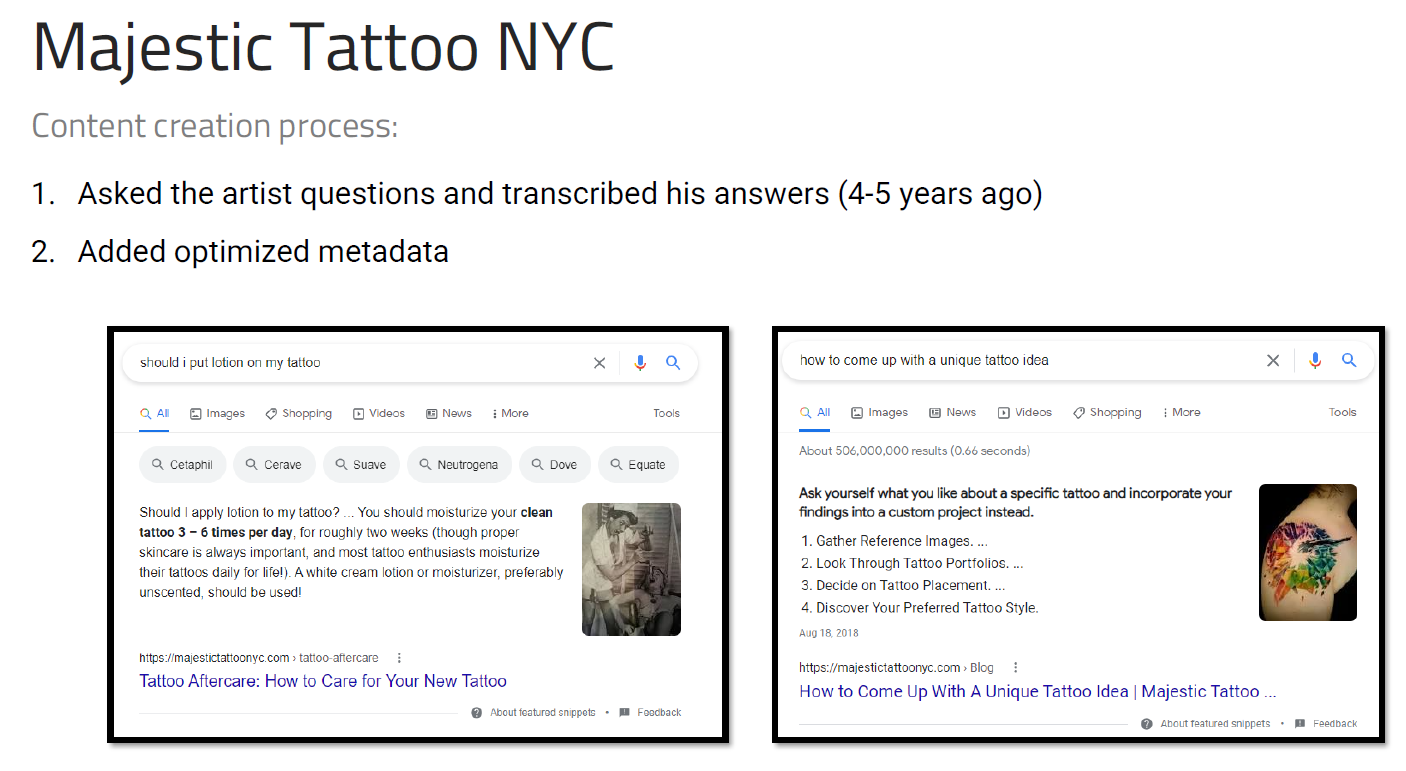 These articles actually rank in the Featured Snippets, because you cannot recreate or fake being an expert on something when you can actually just use the expert’s brain and their insights to help you create that content. You can’t compete with that if you’re an SEO agency trying to reverse engineer those insights.
These articles actually rank in the Featured Snippets, because you cannot recreate or fake being an expert on something when you can actually just use the expert’s brain and their insights to help you create that content. You can’t compete with that if you’re an SEO agency trying to reverse engineer those insights.
Another amazing thing about what’s happened with this tattoo shop is that it’s getting these Google My Business justifications. We’re seeing people type “tattoo numbing cream”, Google’s pulling up that tattoo shop because the blog mentions tattoo numbing cream.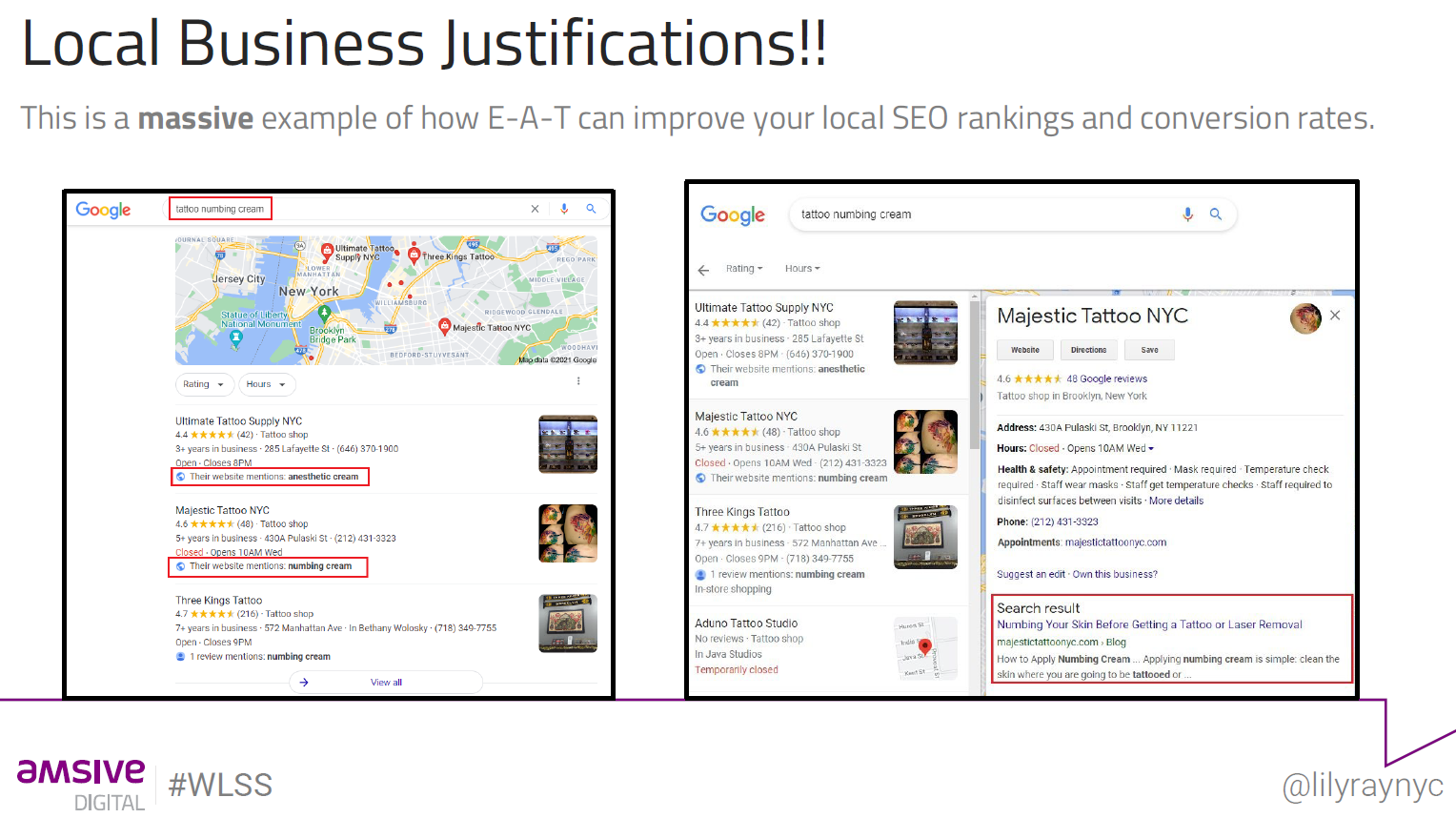 So those articles that we wrote together are actually resulting in better Google My Business results, because Google’s looking at the blog as a source of information.
So those articles that we wrote together are actually resulting in better Google My Business results, because Google’s looking at the blog as a source of information.
Thank you Claire Carlile for bringing this to my attention. This is a really brilliant idea. If you put UTMs in your Google My Business links, you can go into Google Search Console and filter by pages that contain that UTM, then look at your queries.Filter pages by UTMs in GMB to identify search queries used to potentially generate Justifications in GMB – add these to your descriptions, services, etc. These are often high converting keywords driving people to your store and they are often different than what you would expect or currently presenting on your GMB profile.This is a good starting point for understanding potentially the justifications that are driving people to see your business on the Google, the Google My Business justifications. These are really potentially high converting keywords that are driving people to your store. I would really encourage you to look at these because sometimes they’re not what you would expect. It’s different ways of searching then you might be presenting on your Google My Business profile. But if you see that there’s a lot of information in here that Google’s linking back to a blog that you’ve written or other website content that you have, you might want to make those attributes of your business more front and center.
I also encourage you to think about E-A-T as a way of diversifying your local landing page content by showing enthusiasm and expertise of the people who work there.
So, you might say, all my store locations are the same. But if you talk to the staff at those locations, would they actually feel that way? There are so many different ways that you can add unique insights about the business on your local landing pages and this has a variety of different benefits.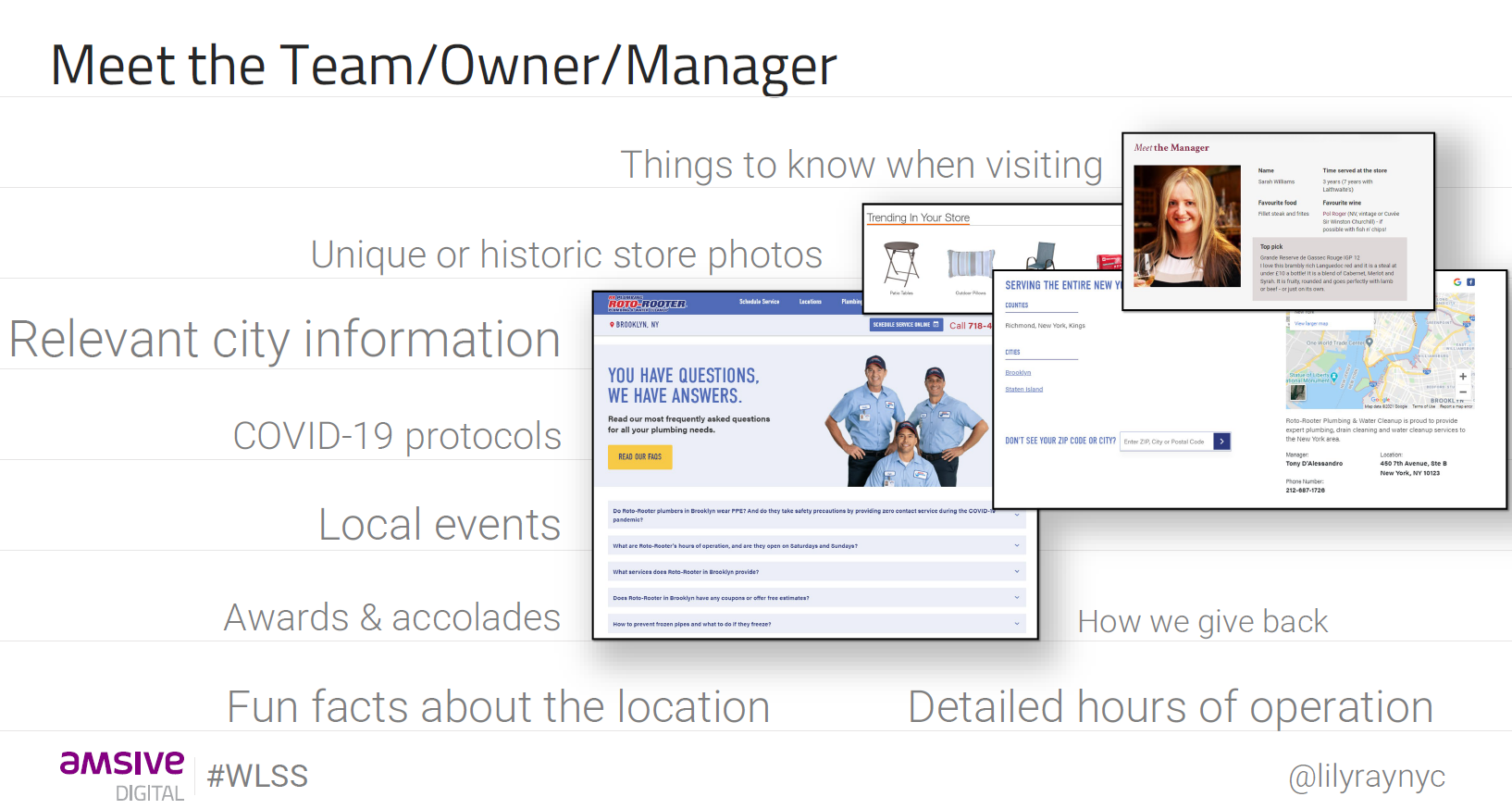 For one, it reduces the duplication from page to page, which is obviously a really big concern in local SEO. It increases trust in the user, because they’re thinking about, Oh, I meet the team or the owner or the manager at this place, or what are the different things that I should know when I’m visiting here. Maybe you have some unique or historic photos about how the business looked 50 years ago, maybe you’re adding really unique COVID-19 protocols, or local events at that location, or anything they should know about that city, or how that location gives back.
For one, it reduces the duplication from page to page, which is obviously a really big concern in local SEO. It increases trust in the user, because they’re thinking about, Oh, I meet the team or the owner or the manager at this place, or what are the different things that I should know when I’m visiting here. Maybe you have some unique or historic photos about how the business looked 50 years ago, maybe you’re adding really unique COVID-19 protocols, or local events at that location, or anything they should know about that city, or how that location gives back.
Put the task of coming up with a lot of this information on the people that work there – they could have fun with it! Ask, what are some unique things that I should know about this location, or who works there, who is the employee of the month, or whatever the case may be. That makes people trust that location more, trust that location page more, and again it has the impact of reducing duplication among local landing pages, which we all know is something that can potentially get you in trouble with Google’s algorithms.
I really encourage you to focus on an expert led approach to your content strategy, and leverage real business owners and real staff at those locations whenever you can.
Questions to ask your clients
Some pushback that I get from SEO professionals when we talk about this is they say, “Well, I don’t have access to experts or they won’t give me their time”. Okay, that’s fine.
Expert reviewed content
But maybe the experts can be involved in at least reviewing the content for accuracy. You’ll notice in many cases, somebody else wrote the content, but then the expert or the business owner will actually go back in there and just review and make sure that everything’s kosher. Then you can say this was reviewed by XYZ expert.
Transcribe video or podcast content
Again, you can transcribe expert video content or podcasts as text. This is a low hanging fruit opportunity for many businesses that have an expert on staff because they might be doing their own podcast or their own video series. Just making sure that that’s transcribed as text on your website itself. Again, that could potentially result in Google My Business pulling up that page for justification purposes; which is a huge, huge opportunity for Google My Business rankings.
Use expert contributions to curate content
You can also use expert contributions to create the content for you. Maybe you don’t have expertise in a certain area, but you can reach out to experts to ask them, hey, can you contribute to this piece of content that I’m writing, and use their name in the article to show that you’re working with real experts.
Wikipedia page
Also, in some cases, there might be a Wikipedia page for the business, for the business owner, or for an expert that’s connected to the business. There might be all kinds of information on that Wikipedia page about the different things they’ve done, different books they’ve written, just making sure that all of that is front and center, listed on your website. Maybe there are different ways that you can convey that information throughout your Google My Business or anything that conveys expertise of the people that work at your company, that’s going to be really great for E-A-T as well.
Build personal brand
Another piece of feedback that I get from a lot of SEOs is as well, nobody knows who my experts are. Nobody knows who the business owner is. To that, I always say, well, we all started somewhere. Building up an expert’s personal brand, in my opinion, is part of SEO. So how can you get a business owner to care about SEO? Or an expert on staff? How do you get them to care about this process?
Sometimes it’s very difficult to reach out to them and say, hey, I’d love to involve you in something that’s just going to take more of your time and try to get you involved in this process? Well, the answer to that is you stroke their ego and say, this is something that’s going to help your name show up better on Google and the information related to you as an entity is going to show up better when people Google your name, we can control what that looks like.
Tell your experts that this is a method of controlling their branded SERP.
We can potentially push some things down that you don’t want showing up there and we can really clean up the way that the search results look. If you work together with me on this strategy of involving your name more in our content creation process. That usually does the trick.
The expert is the keyword
I’ll also say that, think of the expert or the business owner as a keyword. You should be monitoring how that keyword’s doing in Search Console, filter by that keyword and see what questions people are asking.
Google the name of the business owner or the people that work there and see what comes up. Because this is a strategy that’s part of SEO now. Think about making sure that things look great and optimized and trustworthy when you Google the name of the business owner or potentially the people that work at the business.
You can also use the new Google Search Console Regex filter to spot any E-A-T issues. I’ve shared some of these on Twitter. But basically, you can go into Google Search Console, use the new regex filter and look for things like: scam, fraud, return policy, customer, or who, what, when, where, and why question keywords, plus the name of the brand, or the name of the expert, or the business owner, or somebody that works at the company.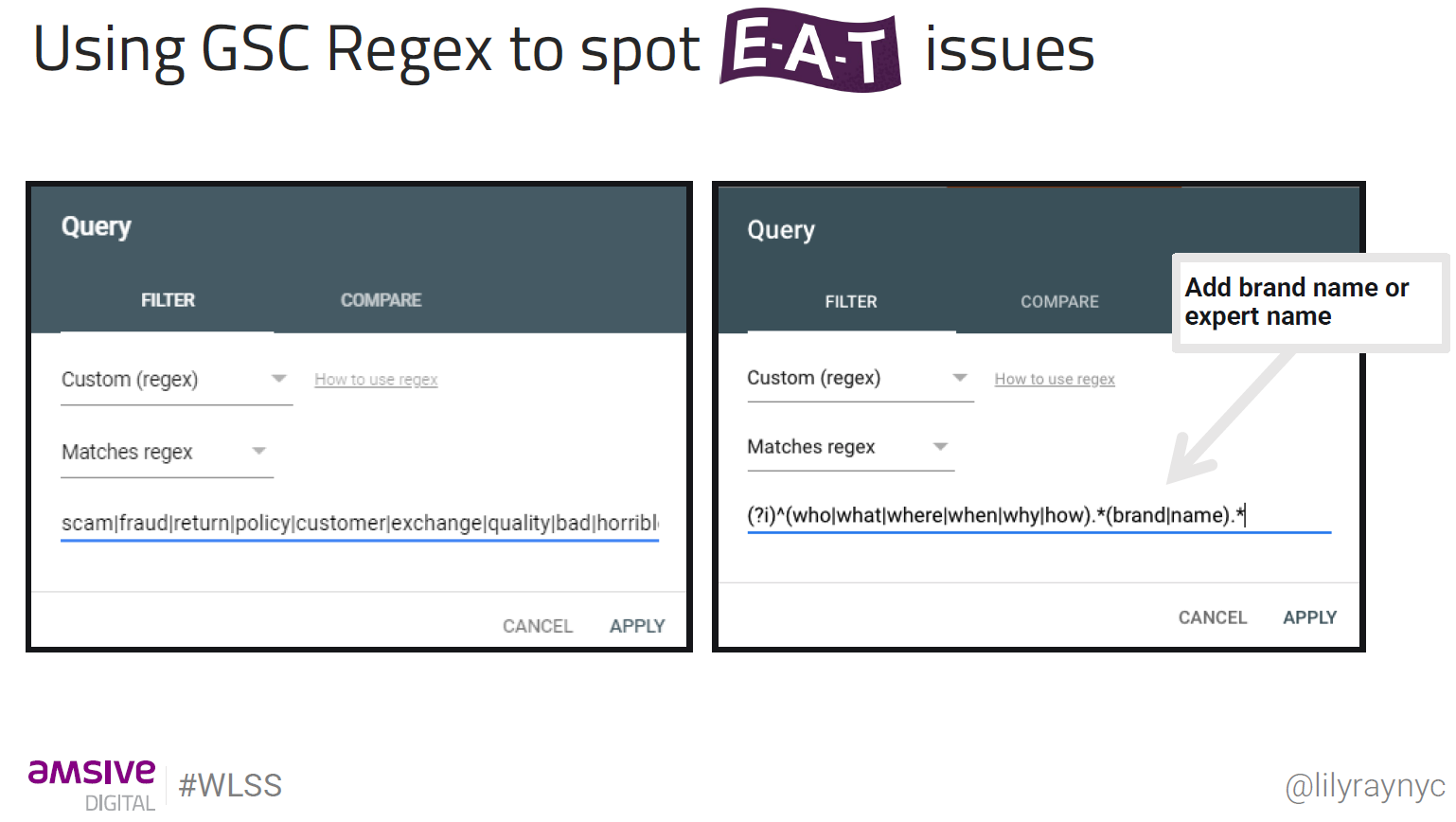 You can see all the different ways that people have searched for qualitative questions or concerns about a given entity or a given business owner, specifically in Google Search Console. You’d be amazed because sometimes you can see like, wow, I didn’t know people were asking that question about my employee. But it’s a good thing to keep an eye on.
You can see all the different ways that people have searched for qualitative questions or concerns about a given entity or a given business owner, specifically in Google Search Console. You’d be amazed because sometimes you can see like, wow, I didn’t know people were asking that question about my employee. But it’s a good thing to keep an eye on.
Lastly, laser focus your content strategy.
So with all of that, thank you very much and I hope you enjoyed it.
Q1. How do you squeeze the good content out of the business owner who is the expert?
Darren: From the perspective of a small business owner in a particular niche, you don’t have to be the world’s expert, you can just be the expert in your city on plumbing, the expert in your city on criminal law, and so many businesses have not recognized that opportunity. I think part of it is that they’re busy running their business and you definitely touched on this in your presentation. But one question I would love to ask is how do you squeeze the good content out of the business owner who is the expert? Let’s say it’s someone who installs gutters, they know how to install gutters, they know everything about gutters, they’ve been doing for 20 years. This guy is an absolute expert. But you ask him a question and he gives you a one word answer. How do you squeeze the knowledge out of that guy? Any advice for the SEO agencies out here trying to trying to get good expert content on their websites?
A1. Schedule a 20 minute conversation with the business owner and use that to create content.
Lily: Probably for those types of blue-collar professions, I would say – because one thing we do is we’ll send out questionnaires where it’s like fill this out over email, and like they don’t want to do that. They’re busy, they’re working with their hands. If you can get some time on their calendar, maybe 20 minutes to speak to them on the phone, try to get it recorded, and just say like, do I have your permission to transcribe some of the stuff you’ve told me today? But have a real conversation with them. It doesn’t have to be SEO driven. But it’s just like, hey, what do you do day to day? What are some of the problems you encounter? Hopefully, they should be able to talk about that. In my experience, they’re excited to talk about it, and then you have that audio file or that video file, so you can use that in a variety of different ways.
Q2. Are there more attainable authoritative sites that small businesses can target that pull information into the Knowledge Graph?
Darren: You mentioned Jason Barnard’s list of places that Google considers authoritative for pulling information into the Knowledge Graph. Some of the things on that list would be like TechCrunch, or Wikipedia, a local business is not going to get in there. Are there some smaller ones on that list that you know of that a local business could maybe get listed on?
A2. Unfortunately it’s not easy. But you can look for roundabout ways to showcase your expertise in your field versus trying to get your business listed on a site. For example, if you’ve written a book you can potentially get listed as an author in Google Scholar.
Lily: Yean it’s tricky. I think both Jason and myself got into the Knowledge Graph because we’re musicians and the reason for that is because we’ve published or released albums that have us as part of it. So, there’s a database of musicians that you can get on as one of the people that contributed to an album and Google pulls from that. But that’s just one example. You can also write a book. For example, a lot of people in the recipe space might write a book. That’s a good way into the Knowledge Graph. Any type of like creative work or maybe even looking into Google Scholar are some different ways. But it’s tricky. Try to look for those roundabout ways where you’ve done something of expertise. That’s the way you get in as opposed to just trying to get a business up there. Because it’s hard, as we all know, to get a Wikipedia page or whatever.
Q3. You mentioned that adding things like fact checked, author bios, or last updated, are like E-A-T band aids. If your content is authoritative but you don’t have those elements, is that a detriment?
Darren: You talked about them being band aids, but let’s say you’re working with a local criminal lawyer, the criminal lawyer is providing really great content, either because you’ve transcribed it through conversations or they wrote it for you, and you put it up on the site. But you don’t have some of those little key elements like author bios, last updated, fact check those kinds of things. If it is authoritative content and you don’t have those things is that a detriment? Is it valuable to add those things? And what are those specific markers you’re looking to add to the content?
A3. If you’re a publisher website then you will likely needs those elements, however; if you’re the small business owner and expert writing it you do not. If you’re the expert and not writing the content, but have reviewed it then you should include those modules only if they are authentic to your editorial process. Those elements cannot replace real subject matter expertise.
Lily: Yeah, that became such like a common strategy the past couple of years as people try to piece together conveying E-A-T throughout the content, which I do think it’s important for like a publisher website where a lot of different people are contributing and we don’t necessarily know if they are working with real doctors to write medical content or something like that.
But if you’re a law firm and assuming, let’s say the lawyer is the one writing the content, I don’t think you need fact check if he’s the one that’s like fact checking, as he writes. If you’re a law firm and you’re working with third party writers that don’t have expertise, I would definitely encourage you to make sure that a lawyer at the firm is reviewing the content, putting their name next to the content, and maybe saying our staff of lawyers reviewed this content for accuracy or something. I would only include those modules when they’re authentic to your editorial process. But I wouldn’t just put factcheck for the sake of putting factcheck if you’re not actually fact checking your content.This information was originally presented at the 2021 Whitespark Local Search Summit. If you want to watch all of the presentations from the event, plus our 2020 event you can purchase our Video Bundle!

We’ve heard about E-A-T (Expertise, Authoritativeness, and Trustworthiness) for major brands and Your Money or Your Life (YMYL) businesses – that usually have landing pages (i.e. content) that can have an impact on a person’s current or future well-being (physical, financial, health, safety, and so on). But E-A-T is crucial for local businesses. The tactics used to convey E-A-T throughout the local SEO landscape are different from tactics used by bigger brands.
In an effort to help more local businesses prioritize strategies to improve their E-A-T and ultimately their local rankings, we are sharing Lily Ray’s Local Search Summit presentation on Creative Strategies for Local Businesses to Convey Expertise, Authority, and Trust.
Watch the video below or read on to learn creative tactics your business can use to improve its perceived E-A-T, which not only helps with SEO performance, but can improve conversions and the overall reputation of your business.
Whitespark provides powerful software and expert services to help businesses and agencies drive more leads through local search.
Founded in 2005 in Edmonton, Alberta, Canada, we initially offered web design and SEO services to local businesses. While we still work closely with many clients locally, we have successfully grown over the past 20 years to support over 100,000 enterprises, agencies, and small businesses globally with our cutting-edge software and services.